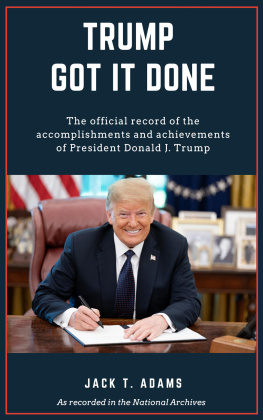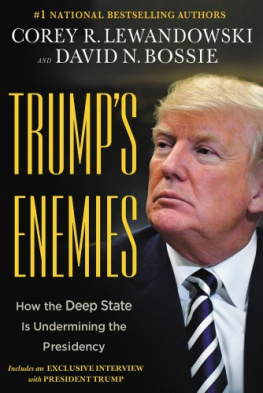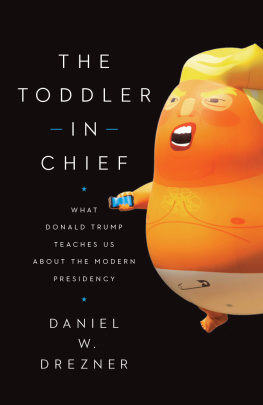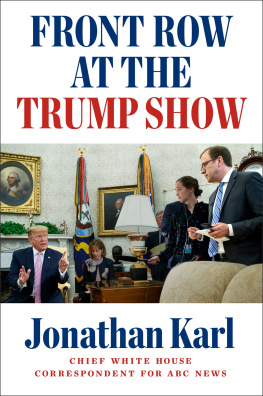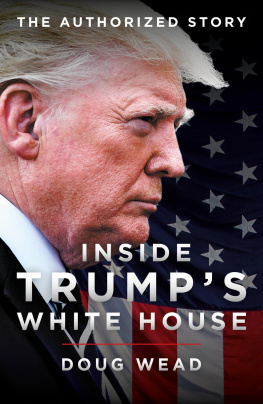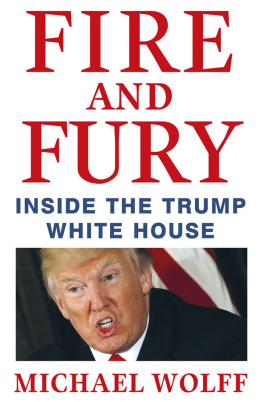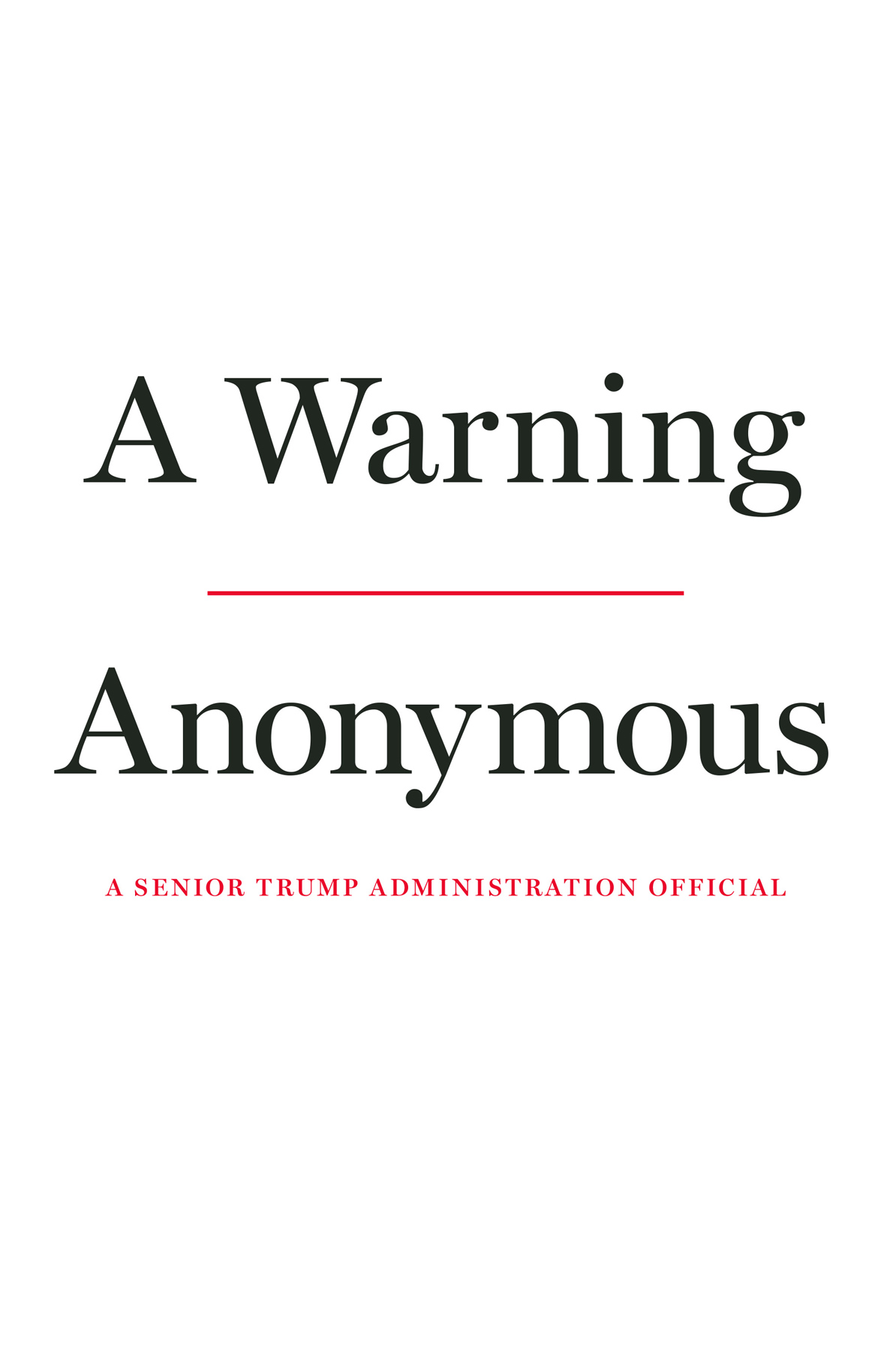
Copyright 2019 by Anonymous
Cover design by Jarrod Taylor.
Cover copyright 2019 by Hachette Book Group, Inc.
Hachette Book Group supports the right to free expression and the value of copyright. The purpose of copyright is to encourage writers and artists to produce the creative works that enrich our culture.
The scanning, uploading, and distribution of this book without permission is a theft of the authors intellectual property. If you would like permission to use material from the book (other than for review purposes), please contact permissions@hbgusa.com. Thank you for your support of the authors rights.
Twelve
Hachette Book Group
1290 Avenue of the Americas
New York, NY 10104
twelvebooks.com
twitter.com/twelvebooks
First Edition: November 2019
Twelve is an imprint of Grand Central Publishing. The Twelve name and logo are trademarks of Hachette Book Group, Inc.
The publisher is not responsible for websites (or their content) that are not owned by the publisher.
The Hachette Speakers Bureau provides a wide range of authors for speaking events. To find out more, go to www.hachettespeakersbureau.com or call (866) 376-6591.
Library of Congress Cataloging-in-Publication Data has been applied for.
ISBNs: 978-1-5387-1846-9 (hardcover), 978-1-5387-1847-6 (ebook)
E3-20191022-NF-ORI
To my children, and the forthcoming generation, whose responsibility it will be to ensure freedoms torch remains lit andas many Americans have before themundertake that it be passed to the next.
Explore book giveaways, sneak peeks, deals, and more.
Tap here to learn more.

Character, in the long run, is the decisive factor in the life of an individual and of nations alike.
Theodore Roosevelt
Here in America we are descended in blood and in spirit from revolutionaries and rebelsmen and women who dared to dissent from accepted doctrine. As their heirs, may we never confuse honest dissent with disloyal subversion.
Dwight D. Eisenhower
T he Donald J. Trump administration will be remembered as among the most tumultuous in American history. Future historians will record the volatility of the presidents decision-making, as well as the internal struggles of a government forced to grapple with it. They will write that his advisors came to find him unfit for the job. He couldnt focus on governing, and he was prone to abuses of power, from ill-conceived schemes to punish his political rivals to a propensity for undermining vital American institutions. They will document how officials considered drasticsome might say desperatemeasures to warn the American people. During the Watergate scandal, key government leaders quit in protest of President Richard Nixons inappropriate activities. The press dubbed it the Saturday Night Massacre. What is not known is that the same measure was considered less than halfway into the Trump administration, as top advisors and cabinet-level officials contemplated what might be called a midnight self-massacre, resigning en masse to call attention to Trumps misconduct and erratic leadership. The idea was abandoned out of fear that it would make a bad situation worse. It got worse anyway. Full awareness of the deteriorating state of affairs dawned on me late one evening, when the loss of a good man revealed the true nature of a troubled one. It was the evening that ultimately led to the writing of this book.

On August 25, 2018, John McCain, one of Americas last great statesmen, died at home in Arizona. In the days that followed, the country mourned the passing of an American hero. McCain, a former military officer, first came to be known to the public for the five years he spent as a prisoner of war in Vietnam, where he was regularly beaten and tortured by enemy forces. One of his captors shattered his right shoulder. They broke his left arm. They cracked his ribs. In his agony, John contemplated suicide. For the rest of his life, he was unable to raise his arms to their full height due to his injuries and the after-effects of the torture. Yet when his captors offered him an early release, he refused until all other Americans captured before him were set free.
McCain finally was released in 1973. He was welcomed home by President Richard Nixon and later embraced as a Republican leader of the future by Ronald Reagan. He went on to build a vast legacy of public service as a member of the US House of Representatives, a senator, and a two-time candidate for president. At his funeral in Washington, DC, John was celebrated and mourned by a bipartisan crowd of government leaders, foreign heads of state, and millions of Americans who watched and listened nationwide.
In one epic life, former president George W. Bush told the mourners, was written the courage and greatness of our country. Former president Barack Obama took to the podium to herald McCain as a patriot who embodied so much that is best in America. He added: When John spoke of virtues like service and duty, it didnt ring hollow. They werent just words to him. It was a truth that he had lived and for which he was prepared to die. A central theme echoed throughout the service. John McCain was a man of character, thoroughly committed to his principles and worthy of reverence, including by people who didnt always agree with him, or who he occasionally irritated with his stubbornness and persistence.
But one man did not share these sentiments. Instead of feeling somberness, he felt spite. Instead of respect, he offered resentment. That man was the sitting president of the United States. It was no secret that Donald J. Trump hated John McCain. He is not a war hero, Trump remarked in 2015 to a stunned audience in Iowa. I like people who werent captured. Though he received McCains support during the general election, then-candidate Trump bristled when the senator withdrew his endorsement in the wake of the Access Hollywood scandal, in which the businessman bragged about grabbing womens private parts, and he could not abide McCains criticisms once in office.
It was no surprise that the president was agitated by the outpouring of public appreciation toward the senator. He is flustered whenever the spotlight shifts away from him, but especially if it moves toward a perceived rival, even a deceased one. What was surprising was the lengths to which he would go to settle the score. President Trump, in unprecedented fashion, was determined to use his office to limit the nations recognition of John McCains legacy.
After being lowered briefly on the day of the senators death, the American flag atop the White House was raised the next evening. Aides worried this would send a bad signal, and tried to have it re-lowered. White House senior advisors implored President Trump to issue a proclamation for flags at all federal office buildings to remain at half-staff. They urged him to issue a formal statement on the late senators death and legacy. These few gestures are standard protocol by any president when a distinguished senator dies, regardless of their party, as a sign of respect for the office and a demonstration that some things come ahead of partisanship. President Trump rebuffed each request. In fact, he wanted all government buildings to hoist their flags back up . Members of the staff were dumbfounded. Many among us had disagreements with John over the years, but we all honored his service to the nation as we would any person who wore the flag of the United States into battle and suffered at the hands of an enemy, let alone his later contributions to our country.


